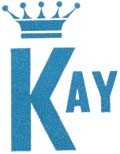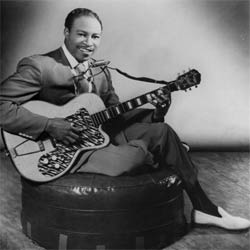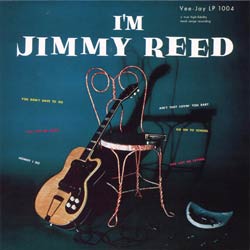

Chicago was a key city in the story of American instrument manufacture; notable guitar brands hailing from the windy city included Harmony, National, Supro (both made by Valco), Silvertone and of course Kay.
Like most early American guitar companies, they actually started out producing other acoustic instruments; the marque actually evolved from the Groeschel Mandolin Company, with 'Kay' not finding use until 1931. Kay upright basses were highly regarded in the 50s and 60s.


In the 1950s and early 1960s, Kay was famous for a number of entry, mid level and rather respectable electric acoustic guitars, most notably Barney Kessel Jazz Special, and the Thin Twin, famously played by bluesman Jimmy Reed. They also produced amplifiers, although this was subcontracted to Valco in the '50s. But Kay (along with Harmony and other manufacturers) also manufactured numerous guitars with alternate branding for the American department stores of the time: Silvertone (Sears), Sherwood and Airline (Montgomery Ward), Old Kraftsman (Spiegel), Custom Kraft (St. Louis Music), Truetone (Western Auto), and Penncrest (JC Penney).
Sales were good and production moved to a new plant, Elk Grove Village, still in Illinois. Kay were distributed by Hohner in the UK, gaining niche respect from the ranks of Chicago blues fans making up many British bands at the time. But like so many American manufacturers of the time, Kay were hit by increasingly strong competition from overseas (especially Japanese) guitar makers. The mid 1960s, although a time for massive guitar sales in the US were a time of massive uncertainty for Kay, with the company sold twice in two years, briefly merging with Valco in 1967, before both companies went under in 1968. This was the end of US Kay production, though the Kay name was again resold to distributor Weiss Musical Instruments who went on to release numerous Kay-branded Japanese Teisco solid bodies from 1973 onwards.
$30
$30
$30
$30
$30
$30
$30
$30
$30
$30